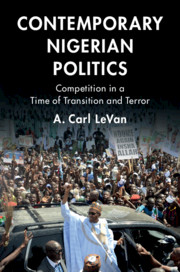Book contents
- Contemporary Nigerian Politics
- Contemporary Nigerian Politics
- Copyright page
- Dedication
- Contents
- Figures
- Tables
- Acknowledgments
- 1 Introduction
- 2 The End of a New Beginning: Nigeria’s Transition, 1999–2015
- 3 The Rational Counter-Terrorist? Economic Policy and Insurgent Insecurity in Nigeria’s 2015 Presidential Campaign
- 4 Voting against Violence? Economic Uncertainty and Physical Insecurity in 2015
- 5 Electoral Integrity, Ethnic Affinity, and Religious Revival in Nigeria’s Party Turnover
- 6 Subnational Subversion and Institutional Stress
- 7 Conclusion
- Bibliography
- Index
7 - Conclusion
Published online by Cambridge University Press: 11 January 2019
- Contemporary Nigerian Politics
- Contemporary Nigerian Politics
- Copyright page
- Dedication
- Contents
- Figures
- Tables
- Acknowledgments
- 1 Introduction
- 2 The End of a New Beginning: Nigeria’s Transition, 1999–2015
- 3 The Rational Counter-Terrorist? Economic Policy and Insurgent Insecurity in Nigeria’s 2015 Presidential Campaign
- 4 Voting against Violence? Economic Uncertainty and Physical Insecurity in 2015
- 5 Electoral Integrity, Ethnic Affinity, and Religious Revival in Nigeria’s Party Turnover
- 6 Subnational Subversion and Institutional Stress
- 7 Conclusion
- Bibliography
- Index
Summary
- Type
- Chapter
- Information
- Contemporary Nigerian PoliticsCompetition in a Time of Transition and Terror, pp. 217 - 238Publisher: Cambridge University PressPrint publication year: 2019

